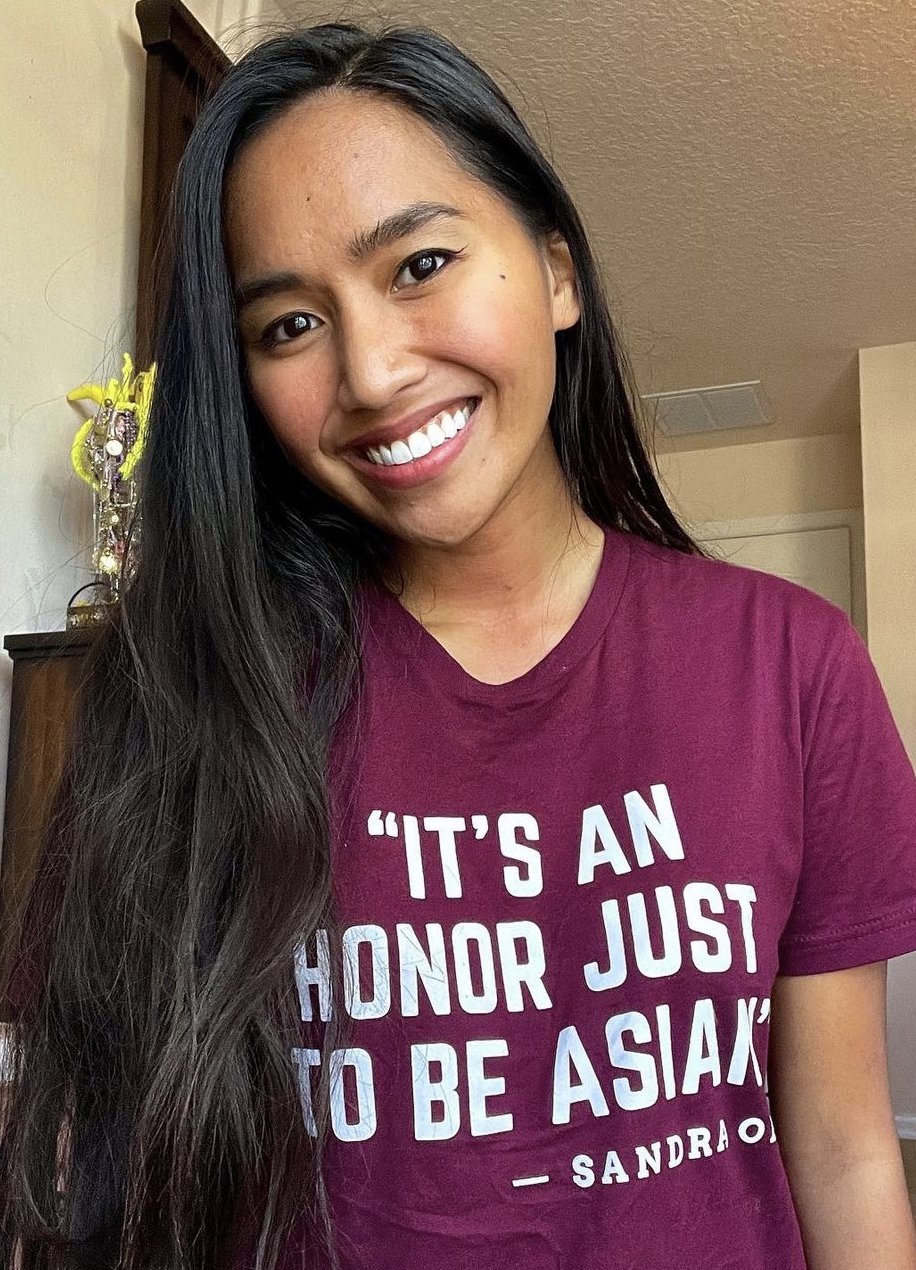Actor, creator Monica Joelle Ortiz thrives with family bonds and Filipino stories
“I love acting. I love being able to create and tell stories, but I also want to help continue that and be a small part of maybe another kid or person being like, ‘Oh my goodness I see myself in them.”
– Monica Joelle Ortiz
The scene is familiar: a Filipino family dances in their living room while their daughter sings a catchy pop song and their doting dad records with his phone camera and sings along. It’s 2020, the song is “Mom” by Meghan Trainor and it’s trending on TikTok. The family’s daughter is Filipino American actor and content creator Monica Joelle Ortiz.
“I love this because it’s just me genuinely doing it for the fun of it, and not thinking about analytics or anything like that, and it was just a fun video,” she said looking back two years later in the summer of 2022.
Ortiz’s family is a mainstay in her videos. Her older brothers and parents make frequent appearances, and their bond is evident. She and her brothers all have, what she says, “unorthodox careers for a traditional immigrant family.” Her oldest brother is a filmmaker, while her other brother is a performer and figure skater.
“I’ve been very lucky to have very open-minded parents, especially immigrant parents,” Ortiz said.
The support her parents show for her acting career is crucial, she says, to the point she believes she wouldn’t have been able to move forward in her entertainment career without them.
The industry is cutthroat and rejection can feel inescapable. And that rejection isn’t always explicit. Oftentimes, it manifests as reminders of the historic marginalization of women and people of color, with fewer roles for Southeast Asian actors, specifically Filipino Americans, and pay inequity for women in Hollywood. Ortiz says these are realities she still navigates as she builds herself up in the industry.
“I'm learning to be a little more confident in standing up for myself and trying to figure out why am I getting paid this or why am I getting treated like this,” she said. “But it’s hard when you’re starting out because you don’t want to be upset or angry at those who gave you these opportunities.”
Monica Joelle Ortiz sports a shirt with a quote from Korean American actor Sandra Oh that reads, “It’s an honor just to be Asian.” (Photo courtesy of Monica Joelle Ortiz.)
The entertainment industry has made some strides in holding space for more inclusive stories. But while Asian American actors have come to the forefront with films like “Everything Everywhere All At Once,” Filipino stories and actors have yet to attain the same level of appreciation. Ortiz says this is part of her motivation to follow the path she’s on. As a teen, long before she knew she wanted to act, she says she gravitated toward Filipino actors in Hollywood.
“I could probably name you all of them through the history of Hollywood because I was just so fascinated by the idea of a Filipino, someone who looked like me or had a similar background of my own, being in Hollywood,” she said.
In recent years, there has been a small rise in Filipino representation, particularly in children’s television. In 2021, the animated shorts series “Jelly, Ben & Pogo,” created and directed by Jalysa Leva, with Filipino American lead characters premiered on PBS Kids. Ortiz celebrated the series by sharing a video of her watching episodes with her family and how it evoked memories of her childhood with her grandparents.
“I love acting. I love being able to create and tell stories, but I also want to help continue that and be a small part of maybe another kid or person being like, ‘Oh my goodness I see myself in them,” she said. “There’s a bunch of kids out there that want to see themselves represented, and I would love to be a part of that.”
At the time of our interview, her brother, the filmmaker, was in pre-production for a feature film centering a Filipino American family. She says she hopes his work can portray Filipinos in a way we haven’t seen in film, specifically in comedy.
“A lot of the time the butt of the joke is the fact that you’re Filipino as opposed to it being situational where certain things are funny regardless of your ethnicity,” she said.
Ortiz was in a transitional period last year. She had just moved to Atlanta with a goal to gain credits outside of commercial work. She created her own podcast, “Chica with Monica,” where she spoke with Filipinos across the diaspora and touched on a multitude of topics from the acting circuit to Asian representation and Indigenous Filipino tattooing. She says she wants to showcase Filipino identity outside of trivial portrayals and stereotypes.
“So I guess that's the next step, is to put out stories that we can all be proud of that don't degrade our parents, our accents, our culture but amplifies them and humanizes them. That’s my goal, is to tell stories and help create stories that humanize immigrants,” she said.
As she was in 2020, you can still find Ortiz sharing pieces of her life and work on TikTok. And as her content branches out and her audiences grow larger, her family and her mission to amplify fellow Filipinos stays close.


